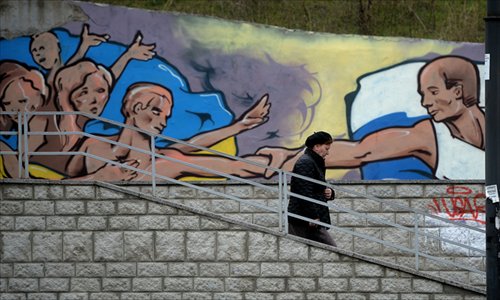G7 calls on Russia to back down

A woman walks by a mural depicting Russian president Vladimir Putin giving a hand to Ukrainians in Simferopol on Wednesday. Lawmakers in Crimea voted for independence from Ukraine on Tuesday in a precursor to a referendum this weekend for the region to become part of Russia. Photo: AFP
The Group of Seven most developed economies on Wednesday called on Russia to stop all efforts to "annex" Ukraine's Crimea region, while a Sunday referendum to decide the Black Sea peninsula's status seems unstoppable.
Analysts said the worst East-West crisis since the Cold War is going to reshape the existing international order, with both Moscow and Washington expected to make strategic shifts.
In a joint statement, the G7 leaders said that they would not recognize the results of a referendum for Crimea and vowed to take further action should Russia "take such a step" in the annexation of Crimea.
The statement marks fresh pressure on Moscow by the group, which earlier threatened to suspend participation in any activities related to preparation for the G8 Sochi meeting later in the year.
EU member states have agreed the wording for Russia sanctions, including travel restrictions and asset freezes against those responsible for violating the sovereignty of Ukraine, Reuters reported.
If approved by EU foreign ministers at a meeting Monday, they would be the first sanctions imposed by the EU against Russia since the end of the Cold War.
Zhao Huasheng, director at the Center for Russia and Central Asia Studies at Fudan University, told the Global Times that the implications of the crisis far outweigh those of Russia's 2008 brief war with Georgia, given the geo-strategic importance of Ukraine for both Russia and the West.
"In Russia, the crisis is seen by some as a game changer, which marks an end to the post-Cold War era as well as the unipolar world, and a symbol of Russia's resurgence," he said.
In Crimea, the region's first deputy prime minister Rustam Temirgaliev told a news conference on Wednesday that Crimea will soon take ownership of Ukrainian state companies on its territory.
He said energy company Chornomornaftohaz and the state railway company would be included, along with several resorts owned by ministries in Kiev.
Crimea has been a tinderbox since pro-Russia militias grabbed control of the peninsula - home to Russia's Black Sea Fleet.
On Tuesday, Ukraine's acting president Oleksandr Turchynov told AFP the country will not use its army to stop Crimea from seceding, as an intervention would leave Ukraine exposed on its eastern border, where he said Russia has massed "significant tank units."
Volodymyr Ariev, an MP from All-Ukrainian Union "Motherland," on Wednesday told the Global Times via e-mail that they see no chance to stop the referendum in Crimea. He described Russian President Vladimir Putin's plans as of "Napoleon level," and said Moscow's goal is to change the system of world stability and security.
The lawmaker raised the Budapest Memorandum signed in 1994, under which Ukraine agreed to give up its Soviet nuclear weapons for security assurances. Russia, the US and Britain are all signatories to the treaty.
"If guarantees wouldn't be executed - it means breaking of all system of international guarantees. We, Ukrainians, hope to get support to our efforts from all [the] world," said Ariev.
Interim Ukrainian Prime Minister Arseniy Yatseniuk on Wednesday headed to the US to meet US President Barack Obama at the White House.
He is also due to address the UN Security Council on Thursday.
Yatseniuk's visit is aimed at winning a $35 billion aid package he says his nation's teetering economy needs to stay afloat over the coming two years.
Washington has already pledged more than $1 billion in economic support, and the Senate is mulling additional sanctions on Moscow.
Zhao said the crisis is not only reshaping the strategic situation in Europe, but also has more profound impacts in the world both economically and politically.
"Moscow will shift its energy policy and seek more natural gas exports to the East, as a result of EU's expected cutting of reliance on Russian gas imports," he said.
Agencies contributed to this story